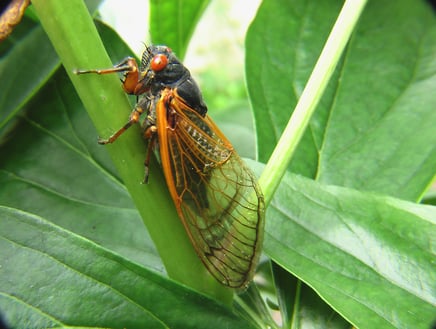Billions of Brood X cicadas are expected to emerge in the next few weeks, or as soon as the soil temperature rises to around 64 degrees Fahrenheit. These periodical cicadas emerge from the ground only every 17 years (so if you think you’ve had it rough laying low since last March, just imagine life as a Brood X cicada). You may be wondering if you should be worried about cicadas in Massachusetts.
 Compared to the last Brood X emergence in 2004, this year’s is predicted to be one of the largest in history. While our region of the country doesn’t appear to be in their path this time around, many of us remember what felt like a cicada apocalypse all those years ago. Outside of sheer volume (both in numbers and noise), there is some mystery surrounding these insects. After all, how well can you know someone you only see once every 17 years?
Compared to the last Brood X emergence in 2004, this year’s is predicted to be one of the largest in history. While our region of the country doesn’t appear to be in their path this time around, many of us remember what felt like a cicada apocalypse all those years ago. Outside of sheer volume (both in numbers and noise), there is some mystery surrounding these insects. After all, how well can you know someone you only see once every 17 years?
When exactly will they emerge?
The timing varies based on location, but the Mid-Atlantic area can expect cicadas to make their appearance around the third week of May – although it could be a bit earlier or later depending on soil temperatures.
What states should expect Brood X?
Between 15 and 18 states can expect company of the noisy, winged variety- and some more than others. The National Wildlife Federation has said that Maryland may be an epicenter for these cicadas, also known as the Great Eastern Brood, but historically they have been seen from Georgia to Michigan, to Illinois, to New York and New Jersey, and many areas in between.
What do cicadas eat?
While underground, they feed on sap from tree roots; as they emerge and shed their skin to become adults, they feed on sap from trees growing new shoots and leaves. Concerned about damage to your trees? According to National Geographic, cicadas pose little threat to mature trees; however, saplings and young trees may be in some danger thanks to egg-laying activity.
Are cicadas dangerous?
In short, no. They do not cause structural damage and will not take up residence inside your home. While they may appear intimidating, with their large size and red eyes, cicadas do not sting, bite, or carry diseases, and are not toxic if eaten by pets. In fact, it's been said that people have even eaten cicadas because they’re high in protein and low in fat and carbs; that said, we wouldn't go that far and certainly would not recommend it.
The bottom line: Brood X is coming, and although their enormous numbers can make life feel like a sci-fi movie for a while, the worst part might be the sound of a billion tiny weed whackers for a few weeks. Once mating is completed and the eggs have hatched, the nymphs will go underground to start the 17-year cycle again, and all will be quiet... Until 2038, that is.
Even if cicadas won't be bugging you anytime soon, your friends at Burgess Pest are here to help with other springtime pests. Download a free copy of our Spring 2021 Pest Guide or schedule a free estimate:


